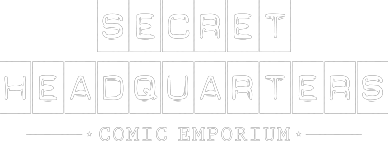COMIC GLOSSARY
For new readers, getting into comic books can be a bit daunting, so to help you out, we have collected a glossary of terms to help you better understand the terminologies used when it comes to this great medium!
Comics: As defined by Scott McCloud in Understanding Comics, comics are “juxtaposed pictorial and other images in deliberate sequence, intended to convey information and/or to produce an aesthetic response in the viewer.” It’s important to note that comics are a medium of storytelling, not a genre of story.
Issue: The traditional 20-25 page (though they can be as long as 60 or 70 pages) serialized comic.
Omnibus: A collected series usually in hardcover. An omnibus is usually the entirety or a significant part of a run, which differentiates it from a trade.
Volume: Another name for a trade.
Floppy: A floppy is a generalized term for a short “floppy” comic. It can refer to an issue, but it usually refers to a standalone story comic.
Run: The term run can refer to multiple things in Big 2 comics: the work a particular creative team did on a particular character (the Fraction/Aja Hawkeye run) or a numbering scheme (the Wilson/Alphona 2014–2015 Ms Marvel run). Runs don’t have to tie into numbering (creative teams can switch without that—for example, the Stewart/Tarr/Fletcher Batgirl run) but when renumbering occurs, like with Ms Marvel, it’s helpful to refer to the years.
Big 2: Marvel Comics and DC Comics.
Indie Comic: A comic that is not published by Marvel Comics, DC Comics, or Image Comics. Some people consider Image Comics indie.
Graphic Novel: Any fictional standalone (not serialized) story that is of book length.
Graphic Memoir: A standalone story that is also a memoir.
Graphic Journalism: Journalism/news reporting that is done in comic form.
LCS: Local comic book shop. (That's us!)
Pull List: A list of comics you have at your LCS that you pick up on a weekly, biweekly, or monthly basis. The shop pulls the comics for you and keeps them in a box, so you make sure you have all your subscriptions.
Final Order Cutoff (FOC): The amount of time a comic shop has before the release date of a comic to place an order, usually three weeks in advance. Comic shops are liable dollar-wise for the comics they order (no returns!), so it’s important to get it right. Whether a series is cancelled often depends on the preorders for first and second issues (yes, the comics industry is broken). The way this applies to the consumer is if there’s a comic you really want to support, make sure you get your order into your retailer before the FOC.
Manga: Japanese comics.
Webcomic: A comic you read, usually for free, on the Internet.
Minicomic: A hand drawn, creator-owned comic that is usually self-produced and stapled together.
Creator-Owned: A comic in which the creative team owns the rights to the characters. Marvel and DC Comics are not creator-owned, whereas Image Comics is the largest creator-owned comics publisher.
